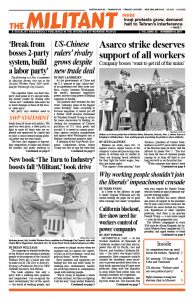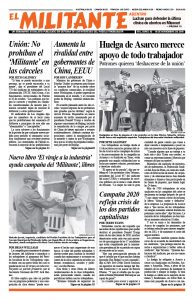As the governments of China and the U.S. prepare to sign “phase-one” of an agreement over their trade conflicts, rivalry between Washington, the world’s dominant imperialist power, and the rising power of Beijing continues to harden.
The planned deal between the two rivals “sidesteps some of the biggest issues dividing” them, according to Fortune magazine. It would put off a further tariff increase threatened by President Donald Trump in return for some concessions by Beijing, including the resumption of Chinese purchases of U.S. farm goods and aircraft. It is touted to contain provisions against currency manipulation and against what Washington says is Beijing’s intellectual property theft.
A meeting of the Asia-Pacific Economic Cooperation forum, where Trump was due to sign the trade deal with Chinese President Xi Jingping in Santiago, Chile, was called off by the host government Oct. 30 in response to a wave of protests against its anti-working-class measures. The government there has imposed a state of emergency and a curfew to try to push back the actions by working people and students.
Since July 2018, the Trump administration has slapped tariffs on $550 billion worth of Chinese products. In return, the Chinese government has imposed duties on $185 billion of U.S. goods. The U.S. rulers wield the greater weight of their domestic market and the U.S. dollar, the global reserve currency, to try to extract more from Beijing in trade negotiations. They hope the measures can hold off the rise of Chinese capitalism and offset their own decline.
The tariff duel shows that behind the facade of a “rules-based” imperialist world order are ruthless conflicts between rival capitalists. Competition in trade and investment between Beijing and Washington intensified in the wake of the global financial crisis a decade ago, as the Chinese capitalists emerged with the second-largest economy in the world. As conflicts for markets and fields of investment sharpen, bosses everywhere are driven to get ahead of rivals by cutting wages and worsening the job and living conditions of working people.
In an Oct. 24 speech, Vice President Mike Pence complained that Beijing “has become even more aggressive and destabilizing,” and that previous U.S. governments had abetted and profited from Beijing’s rising world influence. He claimed the Trump administration’s policies at home and abroad had reversed this course and prevented Beijing from surpassing Washington to become the world’s largest economy.
He repeated the U.S. rulers’ growing concerns about the “archipelago of military bases” Beijing has established on artificial islands in the South China Sea and the rising number of Chinese-owned commercial ports from Sri Lanka to Pakistan to Greece that Washington worries could become naval bases.
But Washington too rose as a world power by seizing markets from competitors and using its deadly military might. It established its supremacy at the end of the Second World War and has inflicted numerous devastating wars on nations around the world since then. The U.S. rulers have spread their own military bases and their unequaled armed might to counter rivals, to try to block revolutionary struggles by workers and the oppressed and hold onto to their dominant position.
Pence demanded that the Chinese government commit to “ending the trade practices that have taken advantage” of U.S. capitalism “for far too long.” He reiterated Washington’s demands that the expanding Chinese market be opened up to more competition by foreign, chiefly U.S., capital. They want Beijing to end its forced transfer of technology from foreign investors in China to Chinese companies and its protectionism through large state subsidies to Chinese enterprises.
The day after Pence’s speech, Hua Chunying, a Chinese foreign ministry spokeswoman, denounced his comments as “lies.” On Oct. 11, the People’s Daily reiterated the position of the Chinese government on the trade talks with Washington, stating that Beijing “cannot be shaken” from subsidizing state firms.
In early October, the Trump administration extended its export black list to 28 Chinese firms engaged in video-surveillance and facial-recognition technology. Huawei, the giant Chinese telecom firm, has been on that restrictive list since May.
Washington applied pressure on the government in Taiwan Nov. 3 to restrict the Taiwan Semiconductor Manufacturing Company, the world’s largest chipmaker, from supplying Huawei now that U.S. supplies to Huawei have been cut off. Washington’s primary concern in curbing high tech exports, especially those with military uses, is to stem Beijing’s rise as a military power that could rival the U.S. imperialists.

